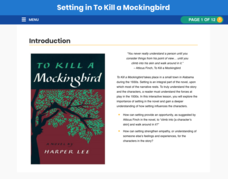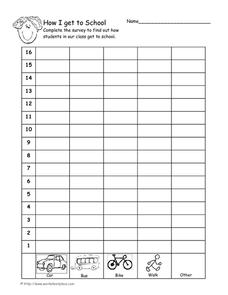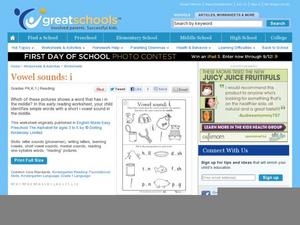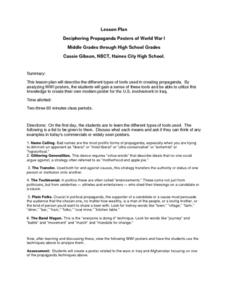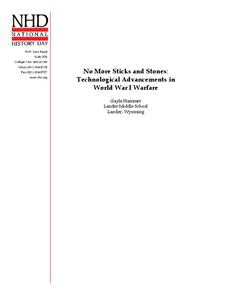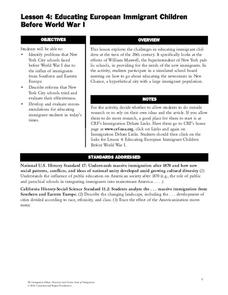Smithsonian Institution
The Soldier’s Experience—Vietnam versus World War I
The Vietnam War and World War I were two very important—and different—wars. To understand the differences, and similarities, class members watch videos, examine primary source documents, and then create a newscast that examines the...
PBS
Setting in To Kill a Mockingbird
Can you understand more about how a person acts by learning about how that person lives? An interactive resource explores the setting of Harper Lee's To Kill a Mockingbird with several slides discussing the location, social conditions,...
PBS
A Time and Place: The Importance of Setting in To Kill a Mockingbird
A strong community acts as a family during difficult times. The evidence for the family aspects of Maycomb is abundant in Harper Lee's To Kill a Mockingbird, and it is the focus of a lesson on the importance of setting as it relates to a...
Literacy Design Collaborative
Using Textual Evidence to Analyze Literary Responses to Historical Events
Scholars analyze Animal Farm to learn how to add textual evidence into essays to support their ideas. They search for a deeper meaning to the story and how it relates to the text Totalitarianism and Revolutions in Russia. To finish,...
PBS
The Legacy of To Kill a Mockingbird: Continuing Atticus’s Fight for Justice
Tom Robinson was only one man in Harper Lee's To Kill a Mockingbird, but he represents many people throughout history who have not found justice in the American justice system. Language arts students discuss the theme of social justice...
Prestwick House
To Kill a Mockingbird
Harper Lee's classic tale of Scout Finch's experience with prejudice and racism, To Kill a Mockingbird, provides the text for a 23-clue crossword puzzle.
Worksheet Place
How I Get to School
Find out how many of your learners take the bus, how many walk, and how many bike with a quick survey. Class members gather data about how each individual gets to school and mark the results on this page in order to create a bar graph.
PBS
To Kill a Mockingbird Teacher's Guide
If you're planning a unit on To Kill a Mockingbird by Harper Lee, don't pass this resource by! It includes thorough discussion questions and vocabulary from the novel, research opportunities, and writing prompts to extend learning...
Curated OER
Hey Teachers! Get to Know Me!
Foster community in your classroom and encourage learners to get up and get to know each other. Individuals each receive the classmate inventory handout included and use it to fill in information about their fellow scholars. Once they...
Curated OER
Vowel Sound: i
As scholars become more comfortable with initial sound correspondence, introduce them to medial sounds. As they focus on the vowel sound /i/, youngsters examine a set of images and draw a line from the letter i to any with that middle...
Curated OER
Deciphering Propaganda Posters of World War I
What strategies are employed when creating propaganda? Your young historians will learn about six different techniques utilized in the construction of political propaganda, particularly in the advertisements of World War I. The...
Curated OER
Tracing the Letter i
Young writers practice their letters in this tracing learning exercise focused on the lower-case i. They focus on how the "magic pencil" writes, and try a few on their own. Next, they trace letters to complete four CVC words, and add an...
Digital Public Library of America
Teaching Guide: Exploring To Kill a Mockingbird
Harper Lee's To Kill a Mockingbird, considered by many to be a seminal piece of American literature, contains many complex literary themes that carry through United States history. Use a series of discussion questions and classroom...
National History Day
No More Sticks and Stones: Technological Advancements in World War I Warfare
Remind young historians that many technological advancements influenced the events of World War I. After analyzing technology's evolution through primary sources, discussing the changes over time, and watching various video clips,...
Curated OER
Martin Luther King Jr's "I Have A Dream" Speech
Invite your class to investigate racism and civil rights by analyzing the great Dr. Martin Luther King's speech. Your learners will read the words from the "I Have a Dream" speech and analyze the political and racial overtones. They will...
National History Day
Propaganda Posters of World War I: Analyzing the Methods Behind the Images
The power of a picture. During the events surrounding World War I, propaganda posters were widely distributed in American society to sway the emotions of its citizens. By analyzing World War I propaganda posters in the first installment...
Constitutional Rights Foundation
Educating European Immigrant Children Before World War I
As if surviving a journey to America wasn't enough of a feat for early 20th century immigrants, they then needed to settle into American life. Learn about the ways New York public education attempted to meet the needs of its high...
Curated OER
Expressing Your Views to the Letter
Analyze the motivation, purpose, and value of letters to the editor by examining letters written in response to the violence at Columbine High School. For homework, middle and high schoolers write their own letters to the editor about an...
K12 Reader
The Spy Will Try Not to Cry
Learn all about the exploits of a sly spy from the short poem included on this resource. The poem, intended to provide practice with long /i/ words that use the letter y, is paired with three reading comprehension questions for pupils to...
Smithsonian Institution
World War I
How did World War I effect the United States' status as a world power? Pupils examine a website to learn many interesting facts about American involvement during World War I. They read passages and interact with artifacts in an online...
Poetry4kids
How to Write a “Favorite Things” List Poem
If your students made a list of their favorite things, would writing poetry be on it? After this poetry writing lesson, it might! Young writers make a list of what they like—or what they don't like—before crafting the list into a rhyming...
National History Day
More Than Mud and Cooties: The Poetry of World War I Soldiers
Poetry is not just for romance. Teach middle schoolers about soldiers' experiences during World War I with poetry written by the soldiers themselves. The lesson includes a simulation activity, a graphic organizer activity, and a...
National History Day
A Clever War: Scientific and Technological Advances in World War I
Technology—changing lives and transforming war. Your tech-loving historians examine photographs and primary documents to explore how technology changed not only World War I, but also how it moved society forward. They apply their...
Core Knowledge Foundation
Volume 2 - A History of the United States: Modern Times—Late 1800s to the 2000s
The second volume of the Core Knowledge History of the United States ebook begins by asking young scholars to consider the impact immigration, industrialization, and urbanization had on the United States in the late 1800s. The text ends...
Other popular searches
- Today I Feel Silly
- Change Y to I
- Letter I Tongue Twister
- Change Y to I Er
- Change Y to I + Er
- Changing Y to I
- <I>stride Toward Freedom</i>
- I Love to Read
- <I>today Is Monday</i>
- </I>read to Your Bunny</i>
- I Lost My Tooth
- <I>count Down to Fall</i>



